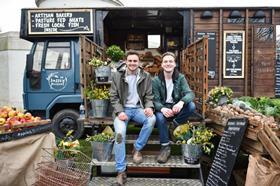
Typically, the phrase “off the back of a truck” denotes something counterfeit, stolen or low quality. But if new grocery startup The Sussex Peasant keeps growing, then it could soon mean quite the opposite.
Stocking meat, dairy, ingredients and stalls brimming with fresh produce, all emerging from the container of a converted horse box, The Sussex Peasant stands out in more ways than one. It also only stocks produce and goods sourced from Sussex.
Founder Ed Johnstone, who opened his first truck in June 2017, says his idea is not about novelty though, but providing people with a new shopping model for an era in which food is becoming increasingly fraught – ethically, environmentally and in health. “We firmly think with what we’re doing now, we can change the face of retail, make it more of an experience, connect people with food,” Johnstone says.
A Sussex native, Johnstone first struck upon the idea after learning how little local produce is consumed within UK counties. “I read that one per cent of food farmed in the home counties remains in the home counties. I thought there’s a big opportunity to change that and make food farmed in Sussex more accessible to people and more convenient. Convenience and accessibility are two key buying factors.”
Johnstone emphasises that The Sussex Peasant is about providing a service as much as an idea. “We capture when people want to shop. The point of difference is we only stock what is produced and farmed here in Sussex, from meat, fish, dairy, vegetables and fruit, we work directly with suppliers.
“Choosing when to trade is a big factor, and so is being convenient; outside train stations, outside schools where there’s a community. If we set up what we were doing on the high street, that might be an easier option, but because we are right on your doorstep it’s genuinely convenient.”
Starting a grocery venture from scratch could have posed a potentially overwhelming challenge at first, but for Johnstone it was a simple case of perseverance: “I put the truck up myself because of the budget. In the day I was gardening and in the evening I was restoring a truck.” Johnstone also built his supply network from a natural starting point, going to farmers’ markets where he could find local growers willing to get on board with his project.
“They were all very keen,” he says. “They had more interest to sell produce to people who care about it, and reflect what they do. Farmers are deeply interested in what their customers are doing. We harvest vegetables on Thursday and by Sunday it’s gone, and they like that fact.”
The advantages of a mobile outfit are pretty simple too: cost. With high streets suffering at the moment in the face of declining footfall and increasing costs, a mobile unit that could address both issues made for an ideal solution.
“We didn’t have the money to afford an offer or brand that was continuously stocked. I couldn’t afford a shop, so I thought ‘what could I afford? Why don’t we do a mobile shop?’ I wouldn’t want to be on the high street having to pay massive rents and business rates. We pay a trading licence, and it’s hundreds for the whole year.”
While Johnstone’s aim was to simply start a viable grocery business, he quickly found he had stumbled onto something that went beyond food. The regular arrival of his truck became a focal point in areas where residents had lost opportunities to simply mingle. “It’s created a really nice atmosphere, a community hub, people come out to sit and talk. It’s created something that’s left a lot of residential streets.”
The community that’s developed around his shop has also created a greater understanding of fresh produce and its vagaries. Bound by seasonal produce, Johnstone says customers are more than accommodating of the ebb and flow of fruit and veg, especially after a 2018 of weather extremes.
“We’ve created a support network; they’re not just customers. Because of our size, when we can’t get something these kind of incidents play into our hands in a way. If we can’t get something because of the snow, or something hasn’t grown because of the weather, it kind of makes our business even more real – our customers end up buying what we have.”
Johnstone says his produce is generally priced at a premium, owing to the logistics of his operation, but says that will change as he expands and develops economies of scale. “It does cost more – it’s not a massive premium – and some things are cheaper. If I had the technology and logistics, as the big players do, I would find a way.
“My job would be much easier and more profitable if I just bought from wholesalers; they could just dump all the stuff, I wouldn’t have to go around picking produce up, but I would lose everything I’m about. That’s the point of difference: we own the supply chain.”
With a second truck opening in Brighton in a week’s time, Johnstone plans to open two more by the end of the year if The Sussex Peasant continues its performance. “We’ve bought the names The Hampshire Peasant, The Kent Peasant and The Gloucestershire Peasant. So that’s what we want to do, but how we do it – franchise or raise money? I don’t know yet.”






No comments yet